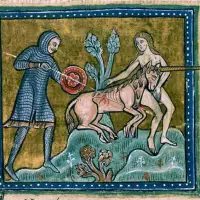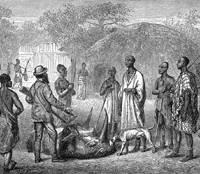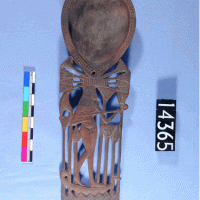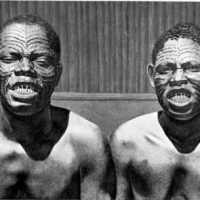Pre-modern cuisine in many parts of the world can be more fully understood not simply as a technical ‘recipe’ to be constructed – but also in relation to the context in which it is situated. Hence, there may be social, sexual, political, religious or other aspects that figure in the total recipe as presented in the finished product. It is our Western proclivity to disassociate fact from context that may create difficulties in understanding a given cuisine in its totality.

Members of an Njĕmbĕ, a Female Secret Society, with cassava, oil and other items for cooking. The woman on the reader-s left and on the child’s right appear to display white painting, which was common in these societies – and still is, in some of them. I will write more about this in another blog. Picture source- Nassau, Fetichism in West Africa.
During his forty years of missionary work in west Africa, the Rev. Nassau seems to have learned this important fact – although it is not specifically stated as such in his works. To examine the approach he uses in incorporating what I shall call the ‘magicality of cuisine’ in an otherwise secular dish I want to talk about the role of love philtres as a key ingredient of certain recipes in pre-modern Liberia (and elsewhere) that figure into the finished cuisine. The Rev. Nassau explains:
For Loving, Love philtres are common, even among the civilized and professedly Christian portion of the community(**). Filtres are male and female(*). If a woman says to herself, ” My husband does not love me ; I will make him love me ! ” or if any woman desires to make any man love her, she prepares a medicine for that purpose. This charm is called “lyele.”
* – A philtre or philter is a magic potion. The word came to Western languages through the Latin philtrum, this from the Greek φίλτρον, phíltron, a love potion; from Greek φίλος, phílos, “dear”, “beloved”; thus a potion or concoction meant to secure someone’s favors or affections.
** – Notions of ‘civilized’ in the Nineteenth Century often were equated with ‘Christianized.’
The process is as follows:
1. Love philtre ingredients:
- First, she scrapes from the sole of her foot some skin, and lays it carefully aside.
- Next, when she has occasion to go to the public latrine at the seaside or on the edge of the forest, she washes her genitals in a small bowl of water, which she secretly carries to her house.
- Then, with a knife, she scrapes a little skin and mucous from the end of her tongue.
- These three ingredients she mixes in a bottle of water, which is to be used in her cooking.
2. Meat or fish ingredients:
The most attractive native mode of cooking fish and meat is in jomba (“bundle”).
- The flesh is cut into pieces and laid in layers with salt, pepper, some crushed oily nut, and a little water.
- These all are tied up tightly in several thicknesses of fresh green plantain leaves, and the bundle is set on a bed of hot coals.
- The water in the bundle is converted into steam before the thick fleshy leaves are charred through.
- The steam, unable to escape, permeates the fibres of the meat, thoroughly cooking it without boiling or burning.
When the above-mentioned woman cooks for the man, her husband, or any other for whom she is making the philtre, the water she uses in the jomba is taken from that prepared bottle. This jomba she sets before him, and he eats of it (unaware, of course, of her intention, or of the special mode of preparation).
It is fully believed that the desired effect is immediate ; that, as soon as he has finished eating, all the thoughts of his heart will be turned toward this woman, and that he will be ready to comply with any wish of hers. No objection to her, or to what she says, coming from any other person in the village, male or female, will be regarded by him.
I know a certain Gabun woman who boasted of her power, by the above-described means, to cause a certain white man whom she loved (but who was not her husband) to do anything at all that she bade him.
Also a small portion from that bottle may be poured (secretly) into the glass of liquor that is to be drunk by a favored guest. This is practised alike on visitors, white or black.
Thus can an additional dimension – generally magical, as above – be incorporated as an integral component of a traditional recipe. This is a fascinating area of cuisine, one that I will be further discussing.
Source – Fetichism in West Africa; Forty Years’ Observation of Native Customs and Superstitions, by the Rev. Robert Hamill Nassau. University Press, Cambridge, U.S.A. 1904.
Thanks to J.W. Frembgen for thoughts on love magic. See – Frembgen, ‘The magicality of the hyena, beliefs and practices in west and south asia, in – Asian Folklore Studies, Vol. 57, No. 2 (1998), pp. 331-344/

























Pingback: Missionaries in Nineteenth Century Africa – A Few Considerations | DIANABUJA'S BLOG: Africa, The Middle East, Agriculture, History and Culture
Pingback: Sacred Huts and Magical Aspects of Food | DIANABUJA'S BLOG: Africa, The Middle East, Agriculture, History and Culture
Pingback: A Self-Love Potion for Valentines Day, and Some More | Kitchen Counter Culture
Pingback: The Magicality of Cuisine 5 – A Spicy Warriors’ Stew, Gabon West Africa | DIANABUJA'S BLOG: Africa, The Middle East, Agriculture, History and Culture
Pingback: The Magicality of Cuisine 4: Feeding the Soil a Stew of Leaves and Bark to Guarantee Successful Gardening, 19th Century Gabon, West Africa | DIANABUJA'S BLOG: Africa, The Middle East, Agriculture, History and Culture
Pingback: The Magicality of Cuisine 3: A Dish of Fish and Plantains to Guarantee Successful Fishing, 19th Century Gabon, West Africa | DIANABUJA'S BLOG: Africa, The Middle East, Agriculture, History and Culture
Pingback: The Magicality of Cuisine 2: A Recipe for a complicated Love Filtre for Men. 19th Century Gabon | DIANABUJA'S BLOG: Africa, The Middle East, Agriculture, History and Culture